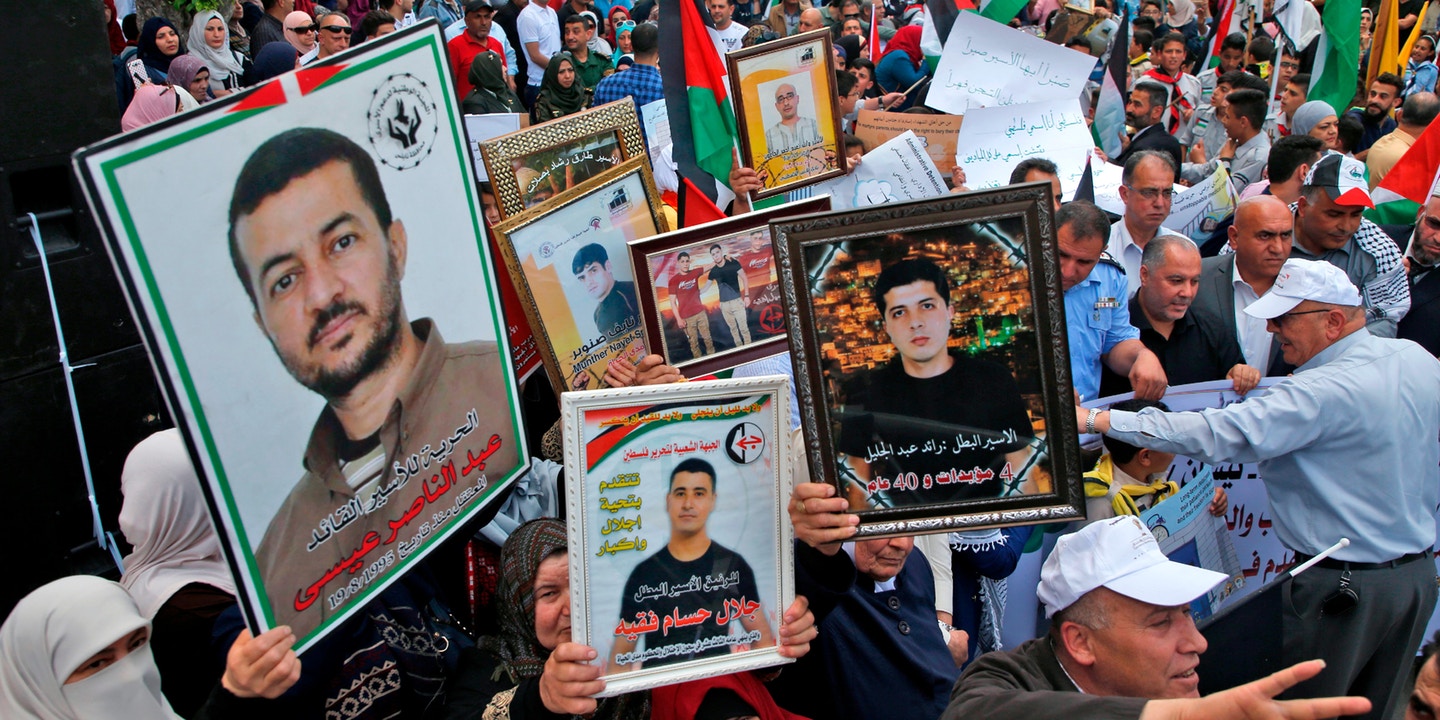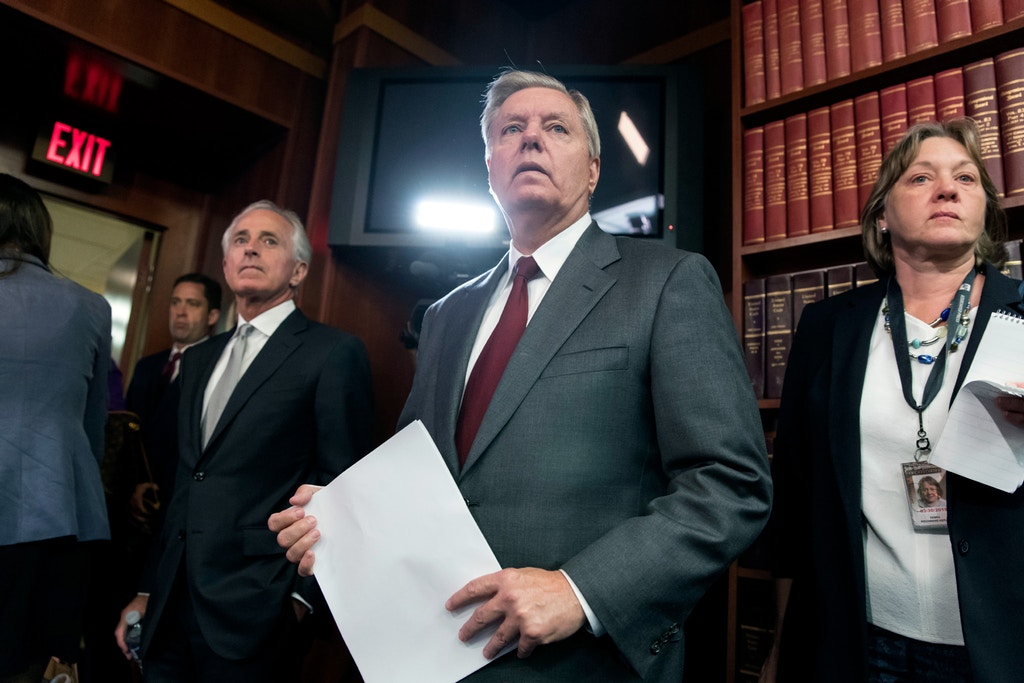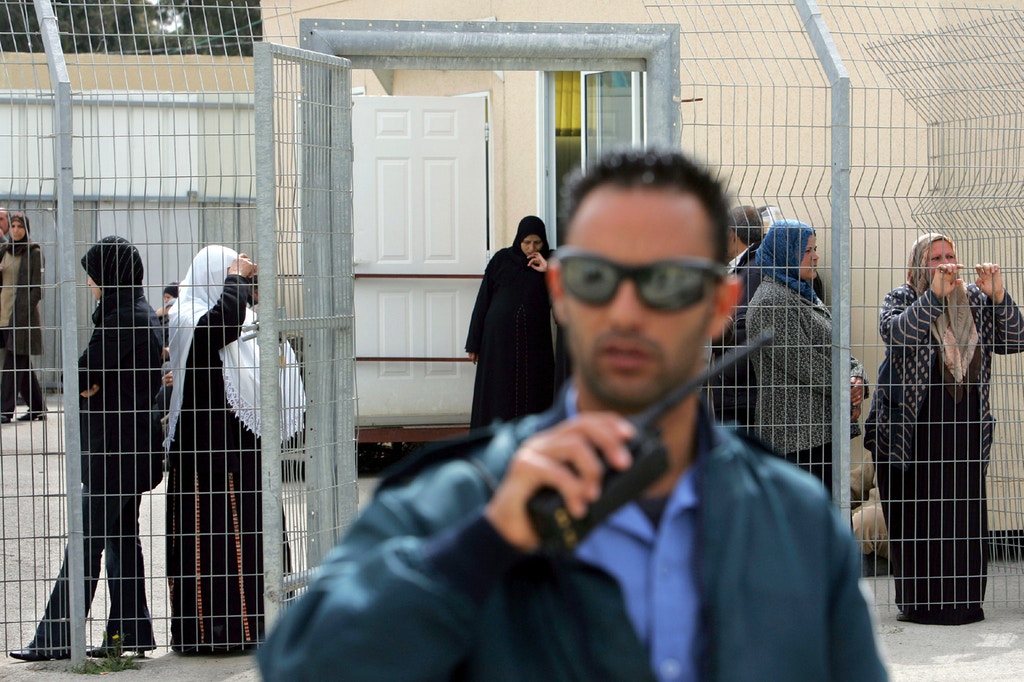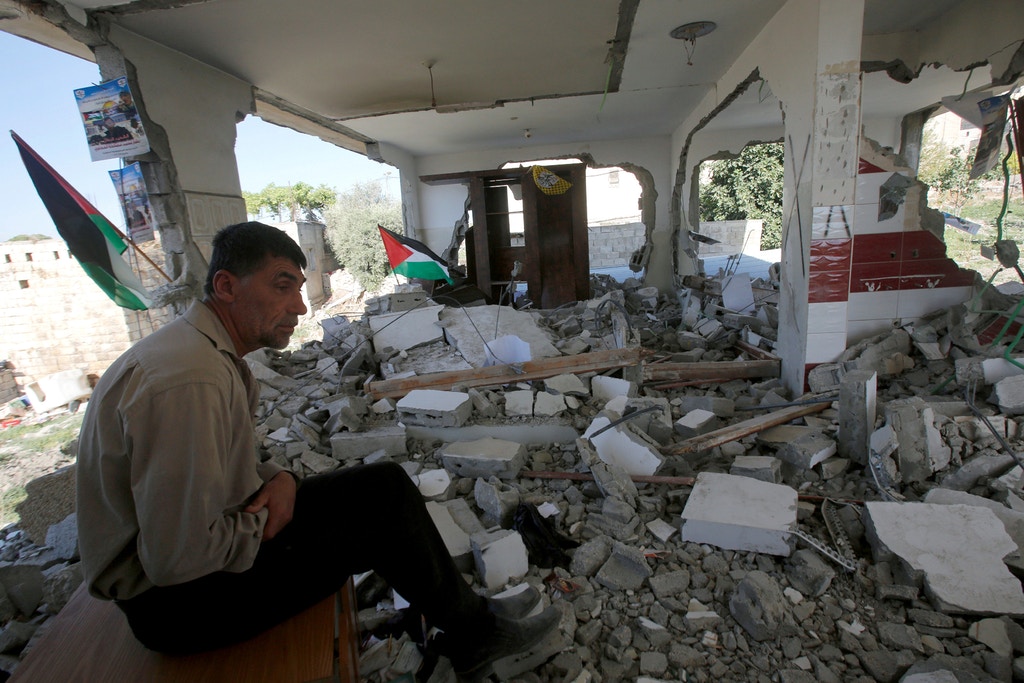U.S. Law Cutting Aid to Palestinians Punishes Any and All Resistance to Israeli Occupation
Henriette Chacar, The Intercept, May 25 2018
Bashar
Masalha lay subdued on a strip of grass along the beachfront promenade of
Jaffa, Israel,
the ancient Mediterranean port that was swallowed up by the development of Tel
Aviv.
 |
|
Photo:
Jaafar Ashtiyeh/AFP/Getty Images
|
The injured Masalha was under the gun of an Israeli volunteer police
officer. Onlookers cheered the officer on, urging him to shoot Masalha in
the head. Seconds later, shots rang out. Masalha was dead. Some bystanders
congratulated the officer, but one yelled, “Stop it! He’s lying there neutralized,
why shoot for no reason?”
Hailing
from the village of Hijja in the northern West Bank, the 22-year-old Masalha
would frequently cross into Israel without a permit in search of work
opportunities. On March 8, 2016, he carried out a stabbing attack in Jaffa,
injuring 10 and killing an American tourist, Taylor Force, before himself being
killed by the police officer. The killing would change the course of relations
between the United States and the Palestinian Authority, the self-governing
body that was established in 1994, as a result of the Oslo Accords, to rule
over the occupied Palestinian territories.
Force,
28, was a West Point graduate who had served in Afghanistan and Iraq. At the
time of his death, he was a first-year student at Vanderbilt University’s Owen
Graduate School of Management. Force was visiting Israel as part of a
Vanderbilt trip to meet with start-up companies and learn about global
entrepreneurship.
 |
|
A 2009
photo provided by the United
States Military Academy shows Taylor
Force. Force,
a 28-year-old MBA student
at Vanderbilt University and a West
Point graduate
who served tours of duty
in Iraq and Afghanistan, was killed
in Israel on March
8, 2016. Photo:
United States Military Academy via AP
|
Almost
two years to the day after Force’s death, President Donald Trump signed the
Taylor Force Act into law as part of an omnibus spending bill. The law cuts off
all financial aid to the Palestinian Authority until the body stops making
payments to political prisoners and the families of those killed by Israeli
security forces. Since the bill was first introduced in 2016, the Palestinian
compensation program, which ran uncontested for decades, has become a
flashpoint in the relationship between the U.S. and the Palestinian
Authority, as tensions grow between American politicians and Palestinian
President Mahmoud Abbas.
Some
observers of the Middle Eastern conflict, however, see the new law as another
step taken by Israel and its backers to make sure that the Palestinian
self-rule government cannot give support to those Palestinians who, in any way,
resist occupation and end up in prison for it.
“This
decision shows that the U.S. prioritizes its interests and its strategic pact
with Israel over human rights,” said Hasan Safadi, the local media officer for
Addameer, a rights organization based in the occupied West Bank that supports
Palestinian prisoners. “All this law attempts to do is label Palestinians who
protect themselves, their lands, and homes as terrorists or criminals.”
In other
words, Safadi said, rather than assuming the role of an impartial mediator, the
U.S. is stripping Palestinians of their right to resist occupation in any form.
 |
| Sen. Lindsey Graham, R-S.C., joined by the Senate Foreign Relations Committee Chairman Sen. Bob Corker, R-Tenn., left, prepares to speak with reporters on Capitol Hill in Washington on Aug. 3, 2017, after the “Taylor Force Act” was approved in committee. Photo: Scott Applewhite/AP |
The
Palestinian compensation program was first addressed by an act of Congress with
the 2015 State and Foreign Operations Appropriations Act, which required
the U.S. to withhold aid proportional to an amount it believed the Palestinian
Authority was funneling into the compensation scheme. That restriction would
expire and would have to be renewed every year.
As a
free-standing law, however, the Taylor Force Act applies to all relevant U.S.
funding for the Palestinians, not only amounts approved in the current fiscal
year. It also impacts funds in the pipeline that were appropriated in previous
years. Unlike the Foreign Operations Appropriations Act, it doesn’t have to be
renewed annually and will remain the law of the land until it’s repealed.
The
Taylor Force Act was originally introduced by the pro-Israel stalwart Sen.
Lindsey Graham, R-S.C., in 2016; Force’s parents, Robbi and Stuart Force, live
on Kiawah Island, South Carolina, and are Graham’s constituents. As a rider to
this year’s appropriations act, it received strong bipartisan backing in both
houses of Congress, passing 256-167 in the House and 65-32 in the Senate.
“Passage
of the Taylor Force Act will serve as a shot across the bow to President Abbas,
as he must be held accountable for the Palestinian Authority’s record of
incitement and subsidizing of terror,” Senate Minority Leader Chuck Schumer,
D-N.Y., said in a statement shortly
before the bill was signed. “It is my hope that by enacting this bill we can
put an end to the Palestinian Authority’s disturbing practice all while
honoring the memory and sacrifice of Taylor Force.”
“This is the sort of thing where either you get behind it, or you hemorrhage political capital over it.”
In the
amendments process, some humanitarian exceptions were included, such as
payments made to the East Jerusalem Hospital Network; assistance for wastewater
projects, capped at $5 million per fiscal year; and programs that provide
vaccinations to children, not exceeding a half-million dollars in any one
fiscal year. Funds supporting the Palestinian Authority’s security
cooperation with Israel will also be unaffected.
“I don’t
envy a responsible, thoughtful member of Congress who’s faced with this kind of
legislation,” Lara Friedman, president of the Foundation for Middle East
Peace, told The Intercept. She said that tying it to the tragic murder of an
American citizen was extremely effective tactic for the bill’s proponents
to use: Members of Congress who might have challenged the principle of the
bill would have been accused of defending terrorism. “This is the sort of thing
where either you get behind it, or you hemorrhage political capital over it.”
According
to Friedman, the law is not about money or fighting terror. It’s about rolling
back the approach toward Palestinians to the 1980s, before the Madrid
negotiations that began the peace process with Israel — “when the word
‘Palestinian,’” said Friedman, “was code for ‘terrorist.’”
 |
| An Israeli prison warden stands guard as relatives of Palestinian prisoners wait for the chance to see them during their hearings in the Israel military court on April 17, 2007, at the Ofer army base on the outskirts of the Palestinian city of Ramallah in the West Bank. Photo: David Silverman/Getty Images |
As of
April 2018, there are 6,036 Palestinian political prisoners in Israeli
detention centers, mostly men, according to
Addameer. Their imprisonment affects the lives of hundreds of
thousands of Palestinians, said Safadi: “This law is a form of collective
punishment on the children who seek to go to school and go on about their
lives, as well as the wives of those prisoners who are definitely experiencing
increased hardship, with the breadwinner of the family gone.”
“This law is a form of collective punishment on the children who seek to go to school and go on about their lives, as well as the wives of those prisoners.”
Monetary
and institutional support for prisoners is anchored in Palestinian law. Over
the past several years, subsidies to prisoners, those killed or injured by
Israel, and their families have amounted to roughly 7 percent of the
Palestinian Authority’s overall budget, according
to the Jerusalem Center for Public Affairs, a right-wing Israeli think tank.
The
Palestinian statute that calls for the payments, Law No. 14 on Aid for
Prisoners in Israeli Prisons, dates back to 2004. Amended Palestinian Prisoners
Law No. 19, also from 2004, guarantees prisoners and their families “a
dignified life” by allocating a monthly salary to prisoners and exempting them
from payments for services such as health insurance and university tuition.
Decree Law No. 1, enacted in 2013, expands on the rights of prisoners and
prioritizes them in annual job placements across all the authority’s
institutions.
Around
the time the two earlier laws were enacted, shortly after the uprising known as
the Second Intifada, Israel stopped providing basic needs for Palestinian
political prisoners and shifted to a canteen system. According to Safadi,
prisoners have since spent their stipend on essentials such as food and
clothing in prison. Families of prisoners can barely make ends meet, he said,
and are more likely to end up with debt by the time a prisoner is released.
The very
cooperation between Israeli authorities and the Palestinian payment system
belies some of the objections, said Friedman, of the Foundation for Middle East
Peace. “We have Congress legislating that this money is illegitimate and
represents the ill-gotten gains for terrorism,” she said, “and yet you have the
Israeli prison system with the canteen actively working with the Palestinian
system.”
The
funds, in a roundabout way, help Palestinians fund their own oppression by the
Israeli state. Safadi said, “By accepting to pay prisoners stipends, the PA
helped Israel deny its responsibilities for those prisoners.”
Legally,
the Palestinian Authority defines prisoners as “anyone incarcerated in the
occupation’s prisons for his participation in the struggle against the
occupation.” It doesn’t distinguish between violent and nonviolent resistance,
or clearly point out which acts were targeted at civilians.
According
to Qaddoura Fares, head of the Palestinian Prisoners Association, these
distinctions are unnecessary, “because the families have no share in the blame.
The way we see it, we’re spending money on the family, not the prisoner. What
if someone with 10 children decided to kill Trump and was convicted? Will
the U.S. government let his family end up in the street? Or are they not
entitled to social welfare?”
What
makes it difficult to distinguish Palestinian perpetrators who have committed
serious offenses from others is not ambiguity in Palestinian law, but the
oppressive court system in Israel, according to Mia Swart, a visiting fellow at
Brookings Doha Center and research director for the Human Sciences Research
Council. Palestinians are often arrested and detained without trial. If they do
get a trial, it’s in an Israeli military court under separate justice
mechanisms “which are by no means fair,” Swart said. “It’s an incredible double
standard.”
The
Palestinian Authority has already stopped paying salaries for political
prisoners associated with Hamas — the rival to Abbas’s ruling Fatah party —
even though those prisoners often find themselves accused of similar acts,
according to Swart.
The Taylor Force Act doesn’t discriminate between attackers who purposefully targeted civilians and other Palestinians who receive subsidies.
The high
proportion of Palestinians held as political prisoners is an important aspect
of the debate, Swart added, because many of them are being loosely associated
with certain acts or are arrested for being in the wrong place at the wrong
time. The Taylor Force Act doesn’t discriminate between attackers who
purposefully targeted civilians and other Palestinians who receive subsidies,
and who might be victims of human rights abuses such as unjust detention. “To
say that the Palestinian Authority should turn its back on many of those men
who are arrested for not committing any crime whatsoever, I think would be
seriously problematic from a human rights perspective,” said Swart.
According
to Friedman, the new law is only the beginning. In a late-2017 summary of the
proposed law, Friedman wrote, “It will open the door for calls for the U.S. to
apply anti-terror laws to the PA – likely the real objective of many of those
who pushed this issue from the start.”
 |
| Mohammad Masalha, father of Bashar Masalha, surveys damage to his family’s home after it was partially demolished by the Israeli forces in the West Bank village of Hijja on June 21, 2016. Photo: Abed Omar Qusini/Reuters |
“I told
my children, we were struck by fire and we must endure the heat,” said Mohammad
Masalha, Bashar’s father. “What Bashar brought upon us is a scorching fire.”
“I told my children, we were struck by fire and we must endure the heat. What Bashar brought upon us is a scorching fire.”
After
Masalha’s attack in 2016, Israel demolished the family’s home. According to
Mohammad Masalha, the Palestinian Authority has subjected the family to
humiliation and residents of the village started distancing themselves from the
family.
In 2017,
the Palestinian intelligence services accused Mohammad Masalha’s eldest son,
Alaa, of joining and accepting payments from Hamas. “But we haven’t taken a
single shekel, not from Hamas and not from Fatah,” said Mohammad Masalha.
In
January, Palestinian security forces came knocking at Alaa’s door again,
accusing him of wanting to sell land to Jewish settlers, which is a criminal
offense under Palestinian Authority statutes. Alaa has been in administrative
detention since, held without charge.
His
detention has been particularly hard on the family, said Mohammad Masalha,
because Alaa was the person looking out for them since Bashar Masalha’s attack.
A lawyer by trade, Alaa put a roof over their heads after Israel demolished
their house.
“Instead
of standing by us and supporting us, the Authority is holding us accountable,”
Mohammad Masalha said. “It’s using us to make a point and say, ‘Look at how
things turned out for the martyr’s family.’”


